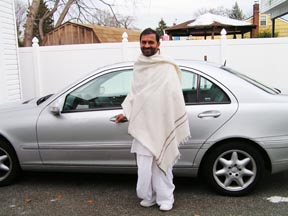Life
Journeys

Have HavanKund, will travel
He’s traveled by car and by plane, by subway and by train, performing hundreds of naming ceremonies, sacred thread ceremonies, weddings and last rites, keeping Hinduism alive for immigrants in far-flung countries. Like a wandering minstrel, Pandit Mahesh Shastri has taken his knowledge of the Shastras and Hindu rituals to countries from Singapore to America. His father
and grandfather before him were priests in Bhageshwar in the Himalayas. Shastri himself was sent to Benares Sanskrit University in Haridwar to learn the scriptures and Sanskrit. After moving to Bombay, he was invited by overseas Indians to Singapore to run the temple there. Since then, he’s lived in Manila, Hong Kong, Thailand, Taiwan as well as Europe, performing religious ceremonies. Shastri now lives in New York, conducting pujas in the tri-state area, driving to wherever he is needed. He has also flown many times to the Caribbean islands to perform Hindu weddings. Since he is fluent in English, he is particularly popular with the younger generation, many of whom cannot speak Hindi. He finds Hindus in America to be very devout and he is kept busy all times of the year performing pujas. The community is generous with its dakshina or donations.
Besides the havans for new homes and shops, pujas for blessing automobiles are particularly popular in America. He says, “When they buy a car, they must do a puja. Here there are more cars, so people do more pujas. We break a coconut, do Devi pujan and then place a picture of God in the car and for raksha or safety, tie a sacred red thread from the temple, generally on the steering wheel handle.” His family is here, comfortably settled and his children have good jobs, but he still feels impelled to continue the work. The community knows him well and expects him to be there for their times of joy and sorrow. He says, “I get a lot of happiness – Jo bhi kar rahe hai bhagwan ke liya kar rahe hai – atma ko ek santosh milta hai. Kudh ko lagta hai yeh profession teek hai.” (Whatever I’m doing it’s for God and the soul gets a lot of contentment. It seems to me it’s a good profession.) He feels he’s helping people to keep their Hindu culture alive and adds, “I’ll feel guilty if I didn’t do it. Where will these people go? Farz nibana hai – one has to do one’s duty.” |



You must be logged in to post a comment Login